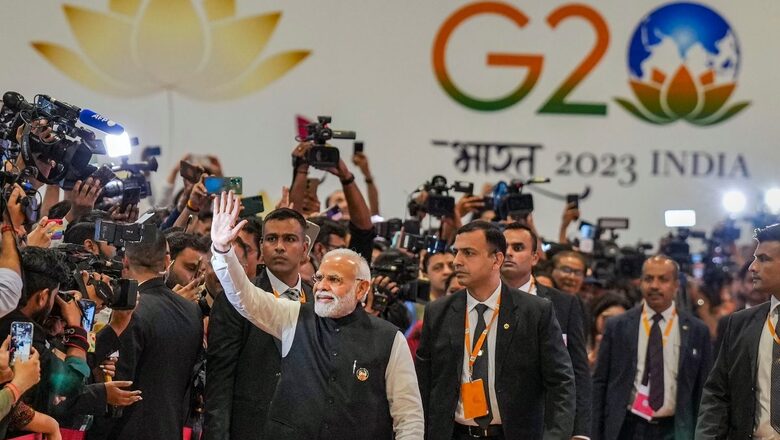
views
“History has been created with the adoption of the New Delhi Leaders’ Declaration. United in consensus and spirit, we pledge to work collaboratively for a better, more prosperous, and harmonious future. My gratitude to all fellow G20 members for their support and cooperation” — Prime Minister Narendra Modi.
Steered by the vision of PM Modi, Bharat’s G20 presidency has delivered phenomenal action on high ambitions for the world. With 83 paras and absolutely no dissent, no footnotes and no chair summaries, the New Delhi Leaders’ Declaration symbolises unparalleled global consensus. “The most important aspect of this declaration is that there is not a single footnote. Last year in the Bali declaration also there was a paragraph but there were some footnotes to that. With the adoption of the New Delhi Declaration and the success of the G20 summit, it has really raised India’s international profile very high,” former diplomat, Veena Sikri said.
It was initially unclear whether G20 member countries would be able to agree to a joint communique, due to highly publicised differences between different camps on the issue of how the Ukraine War would be referred to in the joint declaration. Bharat has so far been releasing an “Outcome Document and Chair’s Summary” statement in place of a joint declaration at the end of major G20 meetings as a result of this. Addressing a press conference ahead of the G20 Leaders’ Summit on 9-10 September, Amitabh Kant said he would reveal more about the declaration, also referred to as a joint communique, after it has been accepted by the leaders. However, he said the declaration will include the voice of the Global South and developing countries. And indeed, the Delhi declaration under the aegis of PM Modi will be etched in history as a turning point for a more vocal Global South.
French President Emmanuel Macron summarised the ethos of the G20 summit, based on shared partnerships and dialogue, when he said, “I think we (India-France) have a strong bilateral partnership. We had a very strong defence partnership and we strengthened this partnership, especially during the past 2 years. The visit of your PM during our Bastille day was a very critical moment. French people were very proud and they felt the friendship and respect for your country. We will follow up on defence, we will develop and deploy on all the different parts of our defence roadmap, additional contracts and procurements in the months and years to come.”
Bharat and Bangladesh also signed three Memorandum of Understanding (MoUs), including one on cooperation in digital payment mechanisms. “India is among our greatest trade partners in Asia and there is huge potential to this partnership,” said Turkiye President Erdogan, once again showcasing the power of ‘Modiplomacy’.
Similarly, with Canadian PM Justin Trudeau, the issue of Khalistani extremism was discussed and thereafter Trudeau made a statement that while free speech is essential, the rule of law has to be adhered to and accepted by all. Also, Bharat and Netherlands and Bharat and Germany, on the sidelines of the G20, reiterated their commitment to continue working together for clean energy, innovation, semiconductors, agriculture, technology and towards a better planet.
Interestingly, Italy’s Prime Minister Giorgia Meloni privately signalled to Chinese Premier Li Qiang that Italy is planning to exit from China’s Belt and Road Initiative (BRI) pact, marking a blow to those who have been singing paeans about a decadent BRI.
Remember, due to PM Modi’s foresight, Bharat refused to join the BRI despite repeated pressure from various vested interests, over the years. The African Union formally took its seat as a new member of the G20 at the invitation of the summit host Prime Minister Modi.
The focus areas of the New Delhi G20 declaration are-
- Strong, sustainable, balanced, and inclusive growth
- Accelerating progress on SDGs
- Green development pact for a sustainable future
- Multilateral institutions for the 21st century
- Reinvigorating multilateralism
The important decisions taken on the first day of the G20 summit included not only the adoption of the New Delhi Leadership Declaration, but announcement of a mega India-Middle East-Europe economic corridor and induction of the African Union (AU) as a permanent member of the Group of 20. The inclusion of the 55-country-strong contingent, AU, was a significant move for Bharat, which has rightfully projected itself as a voice of the Global South. Amitabh Kant, the sherpa of G20, in a series of posts on the platform X (formerly known as Twitter), underscored the importance of the current era as one that should be celebrated as a “golden age of human-centric globalisation.”
US President Joe Biden and PM Narendra Modi at the G20 Delhi summit reinforced their commitment to boost investments in high-quality infrastructure through the partnership for global infrastructure and investment (PGI). “US PGI is committed to mobilizing $200 billion for developing countries by 2027,” US Secretary of State Antony Blinken said in a post. Similarly, Bharat and Italy’s conversation covered various sectors including trade, defence, emerging technologies and much more. Bharat and Italy will continue to work together for global prosperity. Also, on the margins of the G20 Leaders’ Summit, President Biden joined PM Modi and leaders from Argentina, Brazil, Italy, Mauritius and the UAE to launch the Global Biofuels Alliance, a partnership to make progress in our shared commitment to deploy cleaner, greener fuels around the world that help meet our decarbonisation goals.
Leaders from Bangladesh and Singapore also attended as observer countries to the alliance. This alliance is focused on securing the supply of biofuels, ensuring these biofuels remain affordable and are produced sustainably. Founding members of the alliance will continue outreach to other countries committed to these shared values, with the goal of adding more countries to this effort. A total of 19 countries and 12 international organisations have got together to form the International Biofuels Alliance. The launch of the Global Biofuels Alliance (GBA) marks a watershed moment in the quest towards sustainability and clean energy. PM Modi was at the forefront of forging the International Solar Alliance (ISA) in 2015 along with France and the GBA is yet another instance of how climate action is an issue that ‘Modiplimacy’ has always fervently worked for. The goal of GBA is to “take an initiative at a global level to take ethanol blending in petrol up to 20 per cent.” Note that ethanol blending is something PM Modi has been passionately advocating in the last 9.5 years, with Bharat making rapid strides on this count.
A shared commitment to the G20 as the premier forum for international economic cooperation to deliver solutions for our shared world was a theme that resonated with all member countries. The decision to build on the historic progress of Bharat’s G20 presidency to address global challenges going forward was agreed upon. In this spirit, together with the World Bank President, G20’s commitment to building better, bigger, and more effective multilateral development banks was highlighted. External Affairs Minister S Jaishankar credited emerging economies for helping the G20 break a geopolitical deadlock over the Ukraine War. “On the Russia-Ukraine crisis, Bharat worked very closely with Brazil, South Africa and Indonesia. I want to say that it was the emerging markets which played a very key role. There were very tough, very ruthless negotiations for several days non-stop,” Amitabh Kant said during a press briefing.
During the G20 Summit, global leaders, without naming Russia, decried the use of force in Ukraine for territorial gain in a summit statement. Referencing the ‘war in Ukraine’, the New Delhi Leaders’ Summit Declaration said that ‘all States’ should ‘refrain from the threat or use of force to seek territorial acquisition against the territorial integrity and sovereignty or political independence of any State’. But unlike in a G20 statement in Bali last year, there was no explicit reference to Russia in the Delhi Declaration. The lack of any specific reference to Russia should be seen as a major diplomatic coup for Bharat, which managed to put forth its stand on this issue clearly, without harming its partnership with Russia, with whom Bharat shares an excellent and long-standing diplomatic relationship. Interestingly, despite his disappointment with the overall G20 text, Oleg Nikolenko, Ukraine’s foreign ministry spokesman, thanked Ukraine’s allies for doing their part to advance its position in the declaration. “Ukraine is grateful to the partners who tried to include strong formulations in the text,” he said.
Brazil will hold the Presidency of the G20 in 2024 and South Africa will take on the role in 2025. Bharat, the US, the UAE, Saudi Arabia, France, Germany, Italy and the European Union Commission have signed the memorandum of understanding to establish the India-Middle East-Europe Economic Corridor (IMEE EC). This will encourage and provide impetus to economic development through enhanced connectivity and economic integration between Asia, West Asia/Middle East and Europe.
“Together, the United States, India, Brazil, and South Africa reaffirm our shared commitment to the G20 – delivering solutions for our shared world,” US President Joe Biden said in a post. “Japan is delivering various transport infrastructure development projects including the construction of the Delhi metro here in the city to support the economic development of countries. Going forward, we want to take this effort a step further to expand the scope of cooperation to wider areas including supply chains to link people together by strengthening connectivity. We also intend to work on building industrial value chains in the whole of Bay of Bengal,” said Japanese PM Fumio Kishida, reinforcing how under PM Modi, our bilateral relations with global superpowers have moved from strength to strength. Japan is constructing a deep sea port in Bangladesh that would link NE India with SE Asia via the Bay of Bengal.
The G20 Leaders’ Declaration stressed on the need for a diversified, sustainable and responsible supply chain for energy transition, including for critical minerals. The declaration said that the G20 countries support strong international and national enabling environments to foster innovation, voluntary and mutually agreed technology transfer, and access to low-cost financing. It said that the member countries “support reliable, diversified, sustainable and responsible supply chains for energy transitions, including for critical minerals and materials beneficiated at source, semiconductors and technologies.”
In the final analysis, it can be concluded that Bharat’s G20 Presidency had ‘Modiplomacy’ stamped all over it. Consensus on Ukraine was achieved, defining Bharat’s strong stewardship of the G20 under PM Narendra Modi. While Russia and China wanted to avoid discussion on Ukraine, Western nations wanted to condemn Russia. Eventually, a compromise was brokered that significantly toned down criticism of Russia, with Russia not even being named directly. Had Delhi failed to achieve consensus and release a joint declaration, the G20 summit would have come under criticism from anti-national Bharat-hating no-gooders like Rahul Gandhi and the leftist, Soros-loving cabal, who are always waiting in the wings for any opportunity to bring down Bharat.
But thanks to PM Modi, Delhi managed to get a joint declaration which will go down as the biggest takeaway from this hugely successful summit, which tremendously enhanced Bharat’s diplomatic reputation. New Delhi can now concretely point to its record of pushing developing countries’ concerns. Two major things stand out on this count — debt relief and reform of international institutions. Poor countries have been struggling with high debt levels since the COVID-19 pandemic. Bharat managed to speed up the process of helping and bailing out some of them by getting consensus to help new countries like Ghana, Zambia and Ethiopia. The major buzz at G20 was also to reform institutions like the World Bank and the IMF. This will allow them to spend billions on global priorities over the next decade. Besides this, progress in discussions on highly complex global tax reforms also took place. Member countries agreed to consider regulations on cryptocurrencies given the threat they pose to the stability of the financial system.
Bharat successfully pushed digital public infrastructure (Aadhaar, UPI) as a means of financial inclusion. This is expected to help Bharat to export its homemade tech solutions across the developing world and is a masterstroke, as mentioned by the noted Shashank Mattoo, in a brilliantly written series of posts on the platform X. This further boosts Bharat’s international reputation as a provider of global solutions.
“One Earth, One Family, One Future” was the focus of the hugely successful G20 Summit that concluded in New Delhi under the splendid leadership of the visionary Prime Minister Modi. Building resilient supply chains, making quality infrastructure investments, and creating a better future that represents greater opportunity, dignity, and prosperity for everyone, with a sharp focus away from a GDP-centric to a human-centric approach, have been the resounding themes of this summit.
The G20 Summit 2023, hosted by Bharat, will forever be remembered as one of the most important events in the modern history of contemporary times. The motto of Bharat’s G20 Presidency, ‘Vasudhaiva Kutumbakam’ reflected the core values of the ancient culture of our great land, combining both innovation and spirituality in a seamless, modern blend. As the President of the G20, Bharat has touched upon prominent challenges and come up with much-needed solutions. The induction of the African Union as a permanent member, reaching a consensus on the Delhi Declaration, the launch of the Global Biofuel Alliance, and the announcement of the economic corridors between Bharat, Middle-East and Europe, will pave the way for the prosperity of the G20/G21 members, going forward. “A strong partnership with India is paramount for Europe,” said Ursula von der Leyen, President of the EU Commission, reflecting again, how ‘Modiplomacy’ has raised Bharat’s stock globally.
Today, the world is our oyster and the man who has made that possible is none other than Karmayogi, Prime Minister of Bharat, Narendra Modi, whose tryst with history has been etched on the footprints of time.
Sanju Verma is an Economist, National Spokesperson for BJP and Bestselling Author of “The Modi Gambit”. Views expressed in the above piece are personal and solely that of the author. They do not necessarily reflect News18’s views.













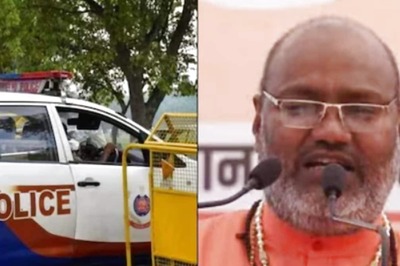
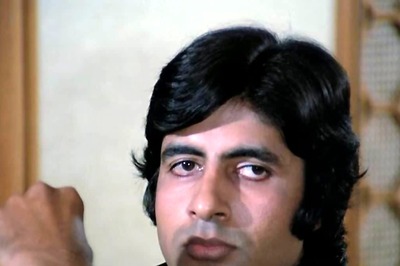

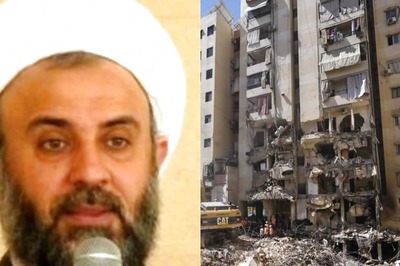

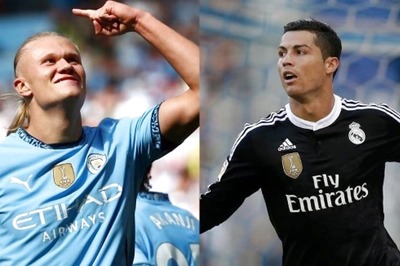
Comments
0 comment